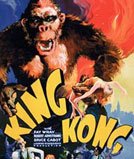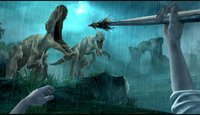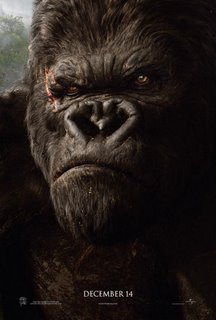According to advance reports, Peter Jackson's upcoming remake of
King Kong will be nearly three hours long and cost over $200 million, which seems like a lot of time and money to squander on a movie about a mad monkey. But done right—the way writer/producer/director Merian C. Cooper and his partner Ernest B. Schoedsack did it in 1933—
Kong's well worth it. The image of a giant gorilla swatting at airplanes with one hand while clutching a pretty girl with the other has become so ingrained into the popular culture that even people who've never seen
King Kong think they know what the movie's about. They're usually wrong. Yes, a monster runs amok in
King Kong, but only at the climax of a multi-faceted, subtly poetic study of vanity.
The long-awaited double-disc King Kong DVD focuses more on the spectacle than the subtext, which is fine, given that the movie itself leans heavy on scenes of Kong kicking ass. Disc two's three-and-a-half-hours worth of documentaries cover the life of showman-adventurer Cooper, as well the groundbreaking effects work that went into bringing Kong to life. The chief draw is a Jackson-supervised reconstruction of a lost sequence where men fall into a giant "spider-pit" and are eaten by creepy-crawlies. It should thrill those who look to King Kong as the precursor to the modern special effects extravaganza, though the featurettes also point out that effects artist Willis O'Brien made Kong into a character, not some hyper-realistic zoo attraction. As for the Cooper hagiography, it's way overdone, especially when the commentators talk about how Cooper and his other partner John Ford liked to make uplifting movies in which "reality doesn't intrude," and then show a clip from Ford's harrowing The Searchers as an example.
The best tidbit in all the DVD set's special features is a mention that Cooper based King Kong's story on an anecdote about an entrepreneur who imported Komodo Dragons for public display, only to find that the change in climate and the grasping hands of tourists did the creatures in. King Kong is in part a cutting piece of self-criticism, with Robert Armstrong starring as a version of Cooper: a fearless entertainment impresario arrogantly convinced that he can bend nature to his will. On the other end of the same spectrum lies Kong, an enormous beast who commands the fear and respect of every living creature on his island, but can't withstand mere civilization.
Betwixt Armstrong and Kong, there's Fay Wray, as an aspiring actress who signs on to Armstrong's theatrical adventure looking to become a star, and ends up becoming the nearly naked love object of a wild animal. (Would real stardom have been much different?) It's a weird love triangle, and a commentary on how arrogance and desire makes animals of us all. It's a portrait that takes a big canvas.











